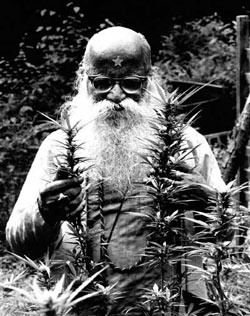There is a recorded history of religions using marijuana seeds and marijuana buds that stretches back for thousands of years.
Most recently a shaman was uncovered by an archaeologist in China dating back 6,000 years who had a stash of marijuana and marijuana seeds buried with him. Items people believed he would need in the afterworld.
That’s right, pot seeds and marijuana bud!
This is now the earliest recorded use of marijuana for both medicinal and spiritual purposes.
Unfortunately, archaeologists don’t make good marijuana growers as their efforts to germinate the thousands of years old marijuana seeds proved futile. Germinating marijuana seeds requires little effort, but really old ones can be troublesome if they’re not correctly stored.
Almost every major world religion, it seems, has made use of marijuana, usually, for spiritual purposes – look at the list below!

Taoism
Ancient Chinese Taoists were at first skeptical about the use of marijuana and marijuana seeds in their religion. They regarded marijuana as “the liberator of sin” for some time. However, while Taoists continued to condemn the hallucinations brought on through excessive use (which they regarded as leading to “seeing devils”), by the first century AD the followers of this religion used marijuana seeds in their incense burners while meditating, believing that the milder effects of marijuana gave them heightened spiritual awareness.
Christianity
“Jesus was a stoner” may sound like the slogan on a counterculture t-shirt, but it may have a grain of truth to it. Some historians believe that cannabis oil derived from marijuana seeds was a central ingredient in Jewish and Christian holy ceremonies. Some of the healing miracles of Jesus have even been attributed to marijuana oil. Marijuana can be absorbed through the skin. Marijuana can relieve the effects of glaucoma, skin ailments and menstrual pains. In addition to this, Rastafarians and some modern Gnostic Christians believe that the Tree of Life is referred to in one Biblical passage (”the leaves of the Tree of Life [that] are for the healing of the nations”) refers to the marijuana plant.
Sufism
Islam has generally condemned the use of marijuana; the religion regards the use of any intoxicants as haraam or forbidden. Sufism (the mystical offshoot of Islam) takes a somewhat different view. This religion believes in knowing God through ecstatic states of mind, and widespread history of marijuana use has been recorded in Sufi culture over the centuries. Indeed, in one Persian folk tale, the founder of Sufism, a monk called Haydar, was the first Persian to discover marijuana. Out walking in the midst of a depressed mood, he came across the marijuana plant and ate several of its leaves. Finding his mood immediately and dramatically improved, he returned to the monastery and recommended that his brother monks should try eating marijuana too.
Hinduism
There is a long history of marijuana use associated with Hinduism. Since about 1500 BC by some records. Marijuana is most commonly consumed in a drink called bhang, mixed in with spices, milk and sugar and drunk during Holi and Baisakhi, key festivals of the Hindu religion. The marijuana plant is associated with the god Shiva, and many Shaivites smoke it in clay pipes called chillums, believing it to be a gift from Shiva to help humans reach a higher spiritual level.
Buddhism
Like in most religions, marijuana use is controversial and divisive in Buddhism. The tenets of Buddhism advise against intoxicants, but in many sects of Chinese Buddhism, marijuana has been used in initiation and mystical rituals since the 5th century BC. Some Tibetan Buddhist priests believe it to be the holiest of plants, and there are many written records that suggest that the founder of Buddhism, Gautama Siddhartha, lived primarily on marijuana seeds and marijuana buds in the years before his enlightenment.
This is an excellent introduction to marijuana use in religion. There are numerous books on the subject exploring the depths cannabis has been used in religion. Because marijuana is an intoxicant many followers of these religions vehemently disagree with the idea that marijuana has a role within it. However, this is information is factual.

